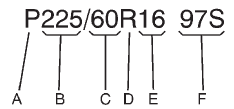Tire Designations
Tire Size
The following is an example of a typical passenger vehicle tire size.

(A) Passenger (P-Metric) Tire: The United States version of a metric tire sizing system. The letter P as the first character in the tire size means a passenger vehicle tire engineered to standards set by the U.S. Tire and Rim Association.
(B) Tire Width: The three-digit number indicates the tire section width in millimeters from sidewall to sidewall.
(C) Aspect Ratio: A two-digit number that indicates the tire height-to-width measurements. For example, if the tire size aspect ratio is 60, as shown in item C of the illustration, it would mean that the tire's sidewall is 60 percent as high as it is wide.
(D) Construction Code: A letter code is used to indicate the type of ply construction in the tire. The letter R means radial ply construction; the letter D means diagonal or bias ply construction; and the letter B means belted-bias ply construction.
(E) Rim Diameter: Diameter of the wheel in inches.
(F) Service Description: These characters represent the load index and speed rating of the tire. The load index represents the load carrying capacity a tire is certified to carry. The speed rating is the maximum speed a tire is certified to carry a load.
See also:
Tips and Troubleshooting Chart
Problem
Recommended Action
No power.
The ignition might not be turned to ON/RUN or ACC/ ACCESSORY.
The picture does not fill the screen. There are black
borders on t ...
Exterior Lamps
The exterior lamps control
is located on the
instrument panel to the left
of the steering wheel.
It controls the following systems:
• Headlamps
• Taillamps
• Parking Lamps
• Licen ...
Vehicle Personalization
Some vehicle features can be
programmed by using the audio
system controls. These features
include:
• Climate and Air Quality
• Comfort and Convenience
• Collision/Detection Systems
†...


